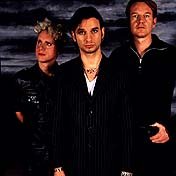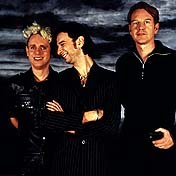- Joined
- Aug 15, 2019
- Messages
- 7,493
- Reaction score
- 143
- Points
- 63
Dark Passage
TV Guide - April 1th, 1997


"I think a lot of my songs are very lonely songs, in a positive way."
Depeche Mode were near goners. In the four years since their last record, Songs of Faith and Devotion, core member Alan Wilder, the trained musician in the band, called it quits, and they almost lost front man Dave Gahan altogether. Caught in the vice of a terrible heroin addiction for four years, it took a botched suicide attempt and an overdose -- during which his heart stopped beating for two minutes -- for Gahan finally to kick his habit. In light of all that, it's not hyperbole to say that it's a near miracle that the band made a new record at all. More astounding still is that Ultra is their freshest, most vital work in years.
Ray Rogers talked with songwriter Martin Gore about the inspiration for these dark epics.
Could you have written these songs without having been through everything with Dave and his addiction and suicide attempt?
Everything that happens around you obviously affects you. I never try to write from Dave's perspective in any way at all. I might not have been through exactly the same things as Dave, but we definitely have a lot in common, so I think that's one of the reasons why the songs do seem to mirror Dave's life.
What's been going on in your life that led you to write songs like "Barrel of a Gun"?
I didn't have a big concept before I sat down to write the songs, but I did notice after the event that a lot of the songs touch on a kind of destiny theme. I think that must be what's going on inside my head. "Barrel of a Gun" is just one of those songs. I think we all have our paths set out for us, and we can stray from them slightly; I think that genetically and socially there is a blueprint there for our lives that we can alter slightly. I don't think that everything's predetermined, but I do think that we don't have as much to say as a lot of people believe.
Over here your career went to a new plateau in the '90s. Do you think that had an effect on your thinking about these issues?
Actually, we were on an up curve at the time of [1990's] Violator, everything just fitted right into place. It's just as simple as that. I think I've just grown older. I've passed a crucial stage in my life -- 30 was a big turning point in my life. I'm now 35. I didn't find it traumatic at the time. It was a gradual thing that lasted several years. It's not like I turned 30 and thought, "I can't face the world."
Although, you've written songs about not wanting to face the world....
I think a lot of my songs are very lonely songs, in a positive way. I don't find any of my songs depressing. Sometimes I get tarred with a Leonard Cohen brush, for being doomy. I never see my songs in that way. Even the ones that are slightly depressing always have a note of optimism to me.
Would you say you're an optimistic person then?
Not particularly. You know, I like Leonard Cohen [laughs].
TV Guide - April 1th, 1997


"I think a lot of my songs are very lonely songs, in a positive way."
Depeche Mode were near goners. In the four years since their last record, Songs of Faith and Devotion, core member Alan Wilder, the trained musician in the band, called it quits, and they almost lost front man Dave Gahan altogether. Caught in the vice of a terrible heroin addiction for four years, it took a botched suicide attempt and an overdose -- during which his heart stopped beating for two minutes -- for Gahan finally to kick his habit. In light of all that, it's not hyperbole to say that it's a near miracle that the band made a new record at all. More astounding still is that Ultra is their freshest, most vital work in years.
Ray Rogers talked with songwriter Martin Gore about the inspiration for these dark epics.
Could you have written these songs without having been through everything with Dave and his addiction and suicide attempt?
Everything that happens around you obviously affects you. I never try to write from Dave's perspective in any way at all. I might not have been through exactly the same things as Dave, but we definitely have a lot in common, so I think that's one of the reasons why the songs do seem to mirror Dave's life.
What's been going on in your life that led you to write songs like "Barrel of a Gun"?
I didn't have a big concept before I sat down to write the songs, but I did notice after the event that a lot of the songs touch on a kind of destiny theme. I think that must be what's going on inside my head. "Barrel of a Gun" is just one of those songs. I think we all have our paths set out for us, and we can stray from them slightly; I think that genetically and socially there is a blueprint there for our lives that we can alter slightly. I don't think that everything's predetermined, but I do think that we don't have as much to say as a lot of people believe.
Over here your career went to a new plateau in the '90s. Do you think that had an effect on your thinking about these issues?
Actually, we were on an up curve at the time of [1990's] Violator, everything just fitted right into place. It's just as simple as that. I think I've just grown older. I've passed a crucial stage in my life -- 30 was a big turning point in my life. I'm now 35. I didn't find it traumatic at the time. It was a gradual thing that lasted several years. It's not like I turned 30 and thought, "I can't face the world."
Although, you've written songs about not wanting to face the world....
I think a lot of my songs are very lonely songs, in a positive way. I don't find any of my songs depressing. Sometimes I get tarred with a Leonard Cohen brush, for being doomy. I never see my songs in that way. Even the ones that are slightly depressing always have a note of optimism to me.
Would you say you're an optimistic person then?
Not particularly. You know, I like Leonard Cohen [laughs].
Photo credits: Stefan De Batselier/London Features
